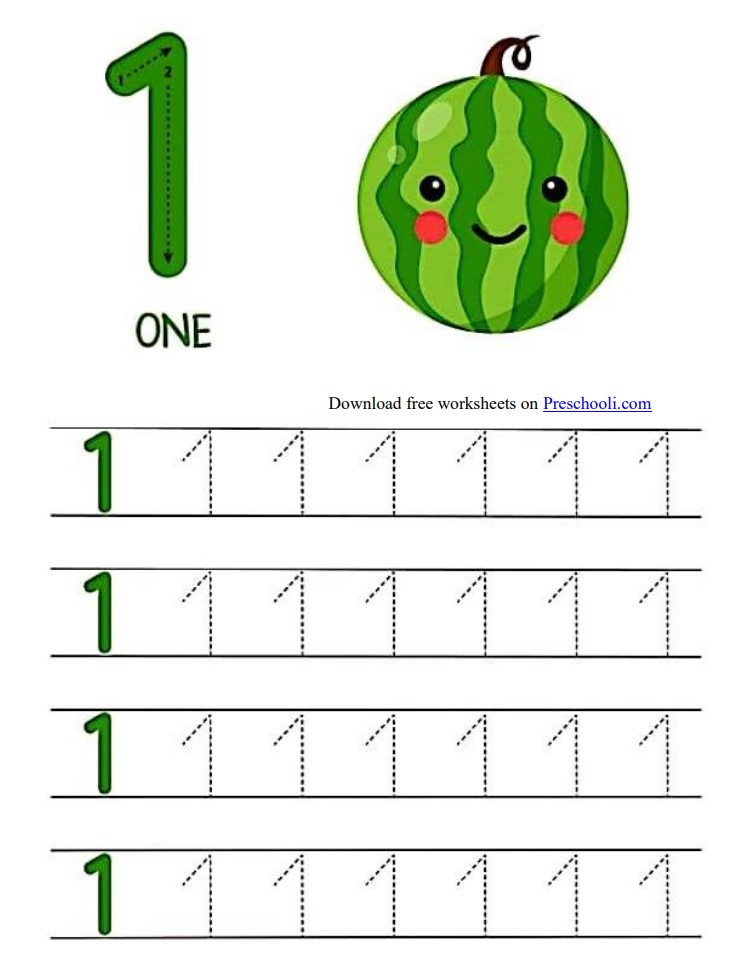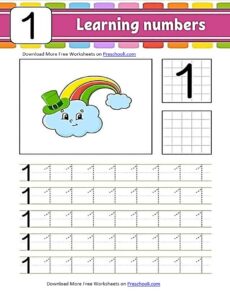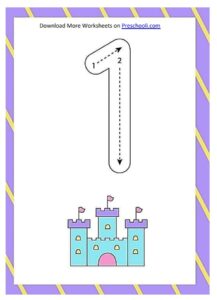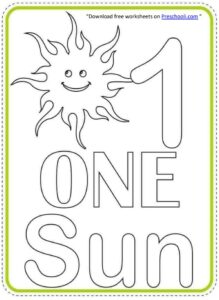Diving into Numbers: The Essential Role of Preschool Worksheets in Early Math Learning
preschool worksheets numbers Learning numbers is a fundamental milestone for preschoolers, laying the groundwork for future mathematical prowess. But how can educators and parents foster strong numerical foundations in the youngest learners? The answer lies in engaging and effective preschool worksheets that make early math a fun, educational adventure.
Understanding the Need for Preschool Worksheets Number in Early Learning
Preschool is where the magic of numbers begins. Children are like sponges, eager to absorb and learn through play and exploration. Number worksheets bridge this gap, providing a structured yet enjoyable way for kids to encounter numeracy. These simple, visually engaging sheets take abstract mathematical concepts and translate them into a tactile, accessible format, which is crucial for the developing minds of preschoolers.
The effectiveness of preschool worksheets for numbers lies in their ability to:
- Introduce concepts in isolation, making them less overwhelming for young learners
- Foster hand-eye coordination as children color, trace, and write numbers
- Create a sense of familiarity and comfort with numerical symbols
- Prepare children for more complex mathematical thinking by building a strong foundation in the basics
Building Blocks to Numerical Fluency Through preschool Worksheets numbers
When children engage with number worksheets, they’re building more than just one-to-one number correspondence. They’re constructing mental pathways that will support a lifetime of mathematical understanding. Here’s how each worksheet acts as a building block in the process of becoming numerically fluent:
Introduction to Number Recognition
The very first step is for children to recognize numbers. With “find the number” and “number tracing” worksheets, kids are introduced to the symbolic language of mathematics. These simple exercises help in developing visual memory and discrimination skills, essential for later identification and differentiation of numbers.
Counting and Quantification
Counting worksheets do more than just teach kids to recite numbers in order. They help children understand the very notion of quantity. Through activities such as circling a number of objects or filling in a sequence, children start to grasp the concept of ‘how many’, which is a foundational skill in number sense.
Writing and Sequencing Numbers
Learning to write numbers is an important fine motor skill. Worksheets that involve number writing and sequencing help reinforce the order of numbers and their sizes, setting the stage for understanding place value and ordinality.
Simple Addition and Subtraction
While it may seem advanced, preschool is the perfect time to introduce the concepts behind addition and subtraction. By using pictures and objects that are part of everyday life, these worksheets demonstrate the practical applications of these mathematical operations in digestible ways.
Tackling Challenges with Creativity and Play
One of the key advantages of number worksheets in preschool is their capability to address common learning challenges with creativity and play. For children who need a little extra help or have different learning styles, these exercises can be personalized and modified to suit their needs.
Catering to Diverse Learners
Every child is different, and this is particularly true in the preschool environment. By offering a variety of manipulatives, colors, and approaches, worksheets can be tailored to suit auditory, visual, and kinesthetic learners, ensuring that each child is engaged and learning at their own pace.
Making Math Enjoyable
The notion that math is a dry, dull subject is one that can form early and be hard to shift. But when numbers are learned through play and enjoyable activities, children come to see math as a fun challenge rather than a chore. Exciting worksheets with puzzles, games, and even stories can turn any preschooler into a math enthusiast.
Integrating Technology for Enhanced Learning
In our increasingly digital world, integrating technology into learning has become more than just a trend—it’s an essential tool for engagement. Even in the realm of preschool number learning, the right use of technology can enhance and enrich the educational experience.
Digital Worksheets for Hands-On, Screen-Based Learning
Digital number worksheets bring the benefits of interactive learning to a screen near you. Touchscreen devices allow children to engage with numbers in a hands-on way, whether it’s by tracing numbers with their fingers or dragging objects to match numerical quantities.
The Role of Educational Apps
Preschool math apps can provide a wealth of interactive and fun experiences for young learners. They incorporate audio-visual stimuli, offering a multisensory approach that suits the very young. Many apps can even adapt to the child’s skill level, ensuring that the learning curve is just right.
The Bridge Between Home and School
When it comes to preschool learning, the transition from home to school is significant. Parents and educators are collaborators in a child’s learning story, and number worksheets can be the common language spoken at home and school.
Home Extensions and Reinforcements
Worksheets can come home, too. Take-home packets of number worksheets can serve as a daily reinforcement of what children learn at school, promoting consistency and retention. They also provide a wonderful window for parents into their child’s educational world, allowing them to see progression and growth firsthand.
Creating a Unified Learning Experience
By using similar worksheets in the home and school, a unified approach to learning is created. This reinforces concepts and allows for a seamless transition between learning environments, which can be a source of comfort and consistency for young children.
Best Practices for Implementing Preschool Number Worksheets
To make the most of number worksheets in preschool education, it’s important to keep certain best practices in mind. Here are a few tips for using these tools effectively:
Use Worksheets as Part of a Varied Curriculum
Worksheets should not be the sole focus of a preschool’s math curriculum. They should be part of a balanced approach that includes hands-on activities, games, stories, and discussions about numbers and their many uses in our world.
Incorporate Worksheets into Play-Based Learning
The best learning occurs when children are playing. By integrating number worksheets into play-based learning, teachers create opportunities for both structured education and imaginative exploration, merging the serious business of learning with the joy of childhood.
Focus on the Process, Not Just the Outcome
While it’s important that children complete their worksheets accurately, the process is equally valuable. Encourage kids to talk through their answers, explain their reasoning, and enjoy the act of learning, not just the finished paper.
Consider Seasonal and Thematic Worksheets
Making learning relevant to a child’s life and interests significantly enhances engagement. Seasonal and thematic worksheets can include familiar elements such as holiday symbols or weather patterns, making numbers not just abstract concepts, but part of the child’s world.
Conclusion: The Power of Preschool Number Worksheets
Preschool number worksheets are powerful tools for introducing and reinforcing early math concepts. Their potential to engage, educate, and foster a love for numbers is immense. By constructing a solid foundation through play, creativity, and technology, we pave the way for a generation of children who are not just numerate, but confident and joyful in their mathematical abilities.
The bridge to mathematical fluency starts with a single number worksheet. Its construction, whether digital or on paper, marks the beginning of a child’s mathematical odyssey. With each carefully designed and thoughtfully implemented worksheet, children take a step further into the world of numbers, ready to count, calculate, and conquer the mathematical challenges that await them in their educational journeys.
Join our Facebook Group



